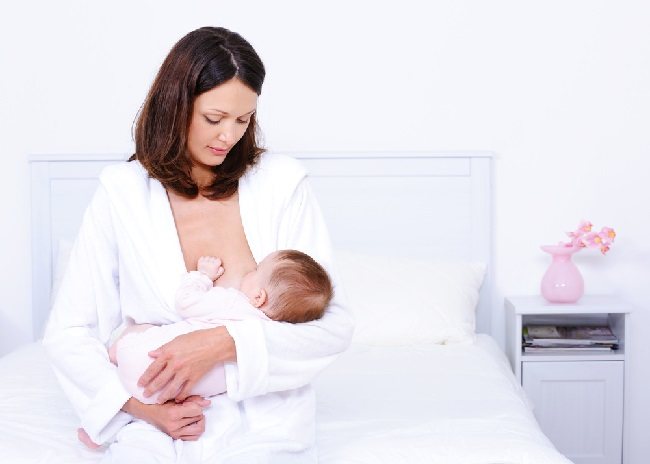Is it possible to get pregnant after childbirth?
A very small percentage of women who have just given birth immediately plan a second pregnancy, if any. However, we see on the streets a lot of young mothers with two small children, who are popularly called the same age. Doctors even equate such brothers and sisters to twins: the difference between them is actually very small. Consequently, the probability of pregnancy immediately after childbirth not only exists, but it is also quite high. And if several decades ago women were confident that conception was impossible while they were breastfeeding, today there are fewer and fewer of them.
When can you get pregnant after childbirth?
A woman’s ability to conceive a child after childbirth is not immediately restored. We know that for the entire period of pregnancy, the activity of the ovaries was suspended, that is, ovulation did not occur at this time, and without the maturation and release of an egg ready for fertilization, conception is in no way possible.
The ovaries continue to “sleep” even in the first time after the birth of the baby. Their activity is mainly suppressed by the now intensively produced hormone prolactin, which is involved in the production of breast milk. Therefore, there is certainly a connection between breastfeeding and the likelihood of pregnancy.
Complete restoration of ovarian function and the resumption of a regular menstrual cycle occurs differently for all women and depends on many circumstances: the individual characteristics of the body, hereditary factors, the course of pregnancy and the birth process, and others, and also largely on the method of feeding the baby.
So, if a newborn is exclusively breastfed (especially if he suckles at night), accordingly, a lot of the hormone prolactin is produced in the female body, then menstruation does not come for a long time . Moreover, when feeding the baby on demand, this process slows down (there may be no menstruation for a year or even longer) until the number of times the baby is put to the breast is reduced; when feeding a child on a schedule or with mixed feeding, the ovaries can start working already 3-4 months after birth. If the mother does not breastfeed at all or breastfeeds very little, then already 1-2 months after birth the menstrual cycle will begin to resume.
The maximum amount of the hormone prolactin is produced at the moment the baby sucks the breast, and therefore the more often and more the mother attaches the baby, the more likely it is that the ovaries will not resume work (that is, ovulation will not occur). But this is just a theory...
Pregnancy after childbirth within the described time frame can occur only in the majority of women who have given birth. But there is also a very high probability that everything will happen differently for you, and that even before your period resumes, an unexpected conception will occur. From personal experience I will say that, despite breastfeeding, my periods began in the next month after giving birth.
Therefore, it is impossible to give an exact and unambiguous answer to the question of how long after giving birth you can get pregnant. But we can say with confidence that it is possible to get pregnant immediately after the birth of a child!
At this time, your period may not have returned yet, as we said. Moreover, ovulation occurs on average 2 weeks before the onset of menstrual bleeding, and therefore the delay in this case cannot be a reliable and reliable sign of pregnancy. It very often happens that pregnancy after childbirth occurs precisely at the very first ovulation, so it never comes until the appearance of menstruation, and the woman at this time continues to think that her cycle simply has not yet returned.
Theoretically, pregnancy after the birth of a child can occur within a few weeks. Therefore, the answer to the question of whether it is possible to get pregnant 2, 3 or 4 months after giving birth is clearly affirmative.
Pregnancy after CS: when is it possible?
The reproductive function itself is restored quite quickly. The method of delivery does not matter. In other words, women in labor after cesarean section, just like mothers after ER, are able to conceive after just a couple of months. However, you need to wait a while before getting pregnant again.
Those who have been through this know what a caesarean section is. This is an abdominal operation on the uterus, after which a scar remains. This moment is key for planning the next baby. The incision site should not just heal.
It is necessary to completely restore the tissue, compact it and strengthen it so that the next pregnancy goes “without incident”.
Abroad, in Japan, for example, doctors allow you to get pregnant again within six months after surgical birth. In Russia, this period has been extended to two years. If conception occurs earlier, complications are possible for both mother and baby. The worst thing is that the stitches on the uterus may come apart. This is life-threatening because... causes massive internal bleeding. Of course, everything is very individual, but after the CS it is still better not to rush.
Pregnancy while breastfeeding
If a woman is breastfeeding, then doctors recommend planning the conception of the next baby no earlier than a year after the end of lactation.
Firstly, the lion's share of the resources of the female body is spent on the needs of the child, along with breast milk. The vitamin and mineral reserves are completely exhausted, and if the mother does not take multivitamin supplements, then she will inevitably experience a deficiency of certain substances. Iron, calcium, iodine, folic acid, and proteins play a particularly important role. That is, in order for the growing fetus to be properly provided with all the substances it needs, the mother must make up for the resulting deficiency, and in general the body requires restoration, which we will talk about below.
Secondly, in order to reduce the already high risks of complications during pregnancy immediately after birth, you will have to wean the older child from the breast. This is a lot of stress for the baby - both on a mental and physiological level. Big changes are already coming in his life (the birth of a brother or sister, attending kindergarten, sharing parental love and attention with another child). And weaning from his mother’s breast, which he feels great need for, will become additional stress.
In addition, breast milk protects the newborn from many pathogenic microbes and strengthens his immunity.
However, it will still be necessary to wean your baby. Among other things, nipple irritation activates the uterine epithelium: the muscles of the uterus become toned, and a miscarriage may occur. And you won’t be going to the maternity hospital with your baby, so whatever you say... It might be worth saving breast milk (if there is an excess of it) for some period of time.
The weaning process must be made as comfortable as possible for the baby and minimally traumatic. But if possible, if the mother feels well and there are no medical contraindications to continuing breastfeeding, it makes sense to delay this moment, the closer to the upcoming birth. It is likely that the older child will refuse the breast himself, since under the influence of hormonal changes occurring in the mother’s body, the taste of milk will also change, and sucking the breast will become much more difficult (with the onset of a new pregnancy, the production of the hormone oxytocin in the mother’s body, which “helped” milk, stops squirt out of the nipple).

Pregnancy after artificial birth
One of the reasons why early pregnancy after childbirth is very undesirable is the weakening of the mother’s body in general and its individual organs in particular. Thus, the abdominal wall and vaginal muscles have not yet returned to tone, remain stretched and are not able to firmly hold the fetus inside. This is a risk factor for the threat of termination of a future pregnancy.
Complications can also arise due to postpartum sutures. If after a natural birth a woman can easily give birth after two years, then pregnancy after a cesarean section should occur earlier than after 3 years, doctors warn. Otherwise, there is a high risk of uterine scar divergence.
Carrying a baby soon after giving birth comes with certain risks. There is a higher chance of complications, including:
- threat of miscarriage;
- risk of premature onset of labor, birth of a premature baby;
- low attachment of the placenta;
- placental insufficiency;
- anemia during pregnancy;
- phlebeurysm;
- weak labor activity;
- opening of bleeding during childbirth;
- low birth weight of the newborn;
- longer postpartum recovery for the mother;
- endometritis after childbirth.
But if you approach the issue with all seriousness and responsibility, then all risks can be minimized. A woman should definitely eat well and take high-quality vitamin complexes, which should be selected together with a doctor. Daily walks in the fresh air are a must. You may have to wear a prenatal bandage from the second trimester.
Adequate rest for the mother is very important: she should never be overtired. It is necessary to ensure that such a woman has the opportunity to rest not only at night, but also during the day, so she will have to involve relatives or nannies in caring for the child. The father must understand the importance of the mother’s health and in every possible way contribute to her good physical and mental well-being, and also be prepared for the fact that during the birth and his wife’s stay in the maternity hospital he will have to be left alone with the child (if the grandmother cannot help).
What happens to the female body during this period?
There is an opinion that a woman who breastfeeds a newborn baby cannot become pregnant. The so-called lactational amenorrhea method is even one of the methods of birth control, although its reliability is not high enough and quite often it leads to forced abortion.
Since the hormone prolactin, which is intensively produced during breastfeeding, suppresses the ovulation process, the likelihood of re-pregnancy in nursing women is sharply reduced. In this case, the woman must put the baby to the breast at his first request, and not introduce additional complementary foods into the baby’s diet, otherwise the reliability of the method drops sharply. As the body recovers after childbirth and the hormonal levels gradually normalize, the pituitary gland gradually increases the production of estrogen, which means that the functioning of the ovaries is restored and the egg can already be fertilized.
According to medical statistics, this usually occurs approximately 8–10 weeks after birth, although it greatly depends on the individual characteristics of the female body. The most dangerous thing in this case is that ovulation precedes the first menstruation after childbirth by about 2-3 weeks, and it is quite difficult to determine the moment of its onset. Therefore, very often a woman, counting on lactational amenorrhea, does not protect herself properly, fertilization of the egg occurs, and menstruation still does not occur, but because of pregnancy. In this case, the woman learns about her situation when the fetus begins to move, and it is no longer possible to have an abortion at this stage.
Read also:
Edema during pregnancy: is it dangerous or not?
For those women who do not breastfeed, the first menstruation appears 4 weeks after birth, and after another 1–1.5 months the cycle is restored. That is, pregnancy can occur even earlier than in nursing mothers.
It is very difficult to combine breastfeeding with bearing a child. In addition to the fact that both processes require a certain amount of useful substances, vitamins and microelements from the mother’s body, during sucking a sharp contraction of the muscles of the uterus occurs, which can cause the threat of interruption. Therefore, doctors may recommend that a woman who decides to keep her baby transfer the first one to artificial nutrition in order to allow the body to recover faster and become stronger enough before the second birth.
During the second pregnancy, due to hormonal changes occurring in the body, the taste of breast milk changes slightly and the patency of the milk ducts in the mammary glands decreases due to a decrease in the production of oxytocin. Since it becomes more difficult to suck milk, and also due to the appearance of a different taste of milk, the child may refuse breastfeeding, which will cause irreparable harm to his health and immunity.
The inner surface of the uterus bleeds continuously for 1.5–2 months after birth. Therefore, doctors recommend abstaining from intimate relationships during this period, so as not to introduce infection into the internal genital organs. And it is even more undesirable to have an abortion during this period.
Curettage of the walls carried out during the process of cleaning the uterus can lead to their injury and the result of such an abortion will be further infertility.
Women with a cesarean section are recommended to plan a second pregnancy no earlier than 2–2.5 years after birth. During the first year, the scar on the uterus should heal well. Often, insufficient restoration of uterine tissue in the area of the incision leads to low attachment of the placenta, which threatens miscarriage. Only after the doctor is convinced that there is no threat of suture dehiscence, the uterus has completely recovered, can the young mother become pregnant again.
Repeated pregnancy a year after the first birth can cause varicose veins in the legs, even if the woman had not previously experienced such a symptom. Also, with the rapid onset of a second pregnancy, existing chronic diseases can sharply worsen.
In the case of repeated births a year after the first, the risk of bleeding, anemia, and weak labor increases. Previously stretched muscles of the uterus and cervix, pelvis and peritoneum, possible damage to the vagina and perineum can cause a threat of interruption.
However, it should be noted that the listed possible health difficulties with the rapid onset of a second pregnancy are not at all a reason for an abortion. The achievements of modern medicine allow a woman to successfully bear another baby immediately after the first birth without much damage to her own health, unless, of course, there are serious medical contraindications for this.
Read also:
Why and how to protect women after childbirth from early pregnancy
Pregnancy immediately after childbirth: giving birth or abortion
Of course, pregnancy immediately after childbirth has its pitfalls. But you shouldn’t even think about abortion... unless doctors insist on it.
If only because the gynecological cleansing procedure itself will deal a big blow to weakened women’s health, especially to her reproductive system. But mainly because after just a few years you will be immensely grateful to yourself for once making the right decision to have a second child. After all, there are a lot of positive aspects in this state of affairs.
Young parents adjust to a new way of life and way of life with the advent of their first baby: their life changes completely. It takes time to get used to and adapt, and when children are born one after another, mom and dad don’t have time to “relax”, and this process happens easily and naturally, and does not require big changes in their established habits and lifestyle. In some ways it's easier.
In addition, the eldest child is still too young to appreciate the advantages and generally understand what it means to be an only child in the family. In this regard, such children less often or do not at all develop feelings of jealousy and rivalry towards the younger one. However, with the arrival of a new baby in the family, let the eldest feel important by bringing additional joys into his life: joint walks, more time spent with his father, and so on.
And one more thing, which is very important: due to a very small difference in age, children of the same age, as a rule, become very close friends and remain so for life. They play with the same toys, are friends with the same children, perhaps even attend the same group in the garden or the same class at school. And as they grow up, they discuss their problems with each other, together look for ways to solve them and find great support in each other.
So if it so happens that you become pregnant shortly after giving birth, then the question needs to be asked what you can and should do to ensure that pregnancy and childbirth go as safely and smoothly as possible for everyone. We have already discussed this issue with you. And you need to start preparing as soon as you find out about your interesting position. You should register as early as possible.

Pros and cons of same-age children
There are different opinions about whether it is good or bad when a family raises children with a small age interval.
Modern women who are building a successful career, promoting a business and creating various projects are not very willing to go on maternity leave. However, at the same time, their picture of the universe includes a beautiful, cozy home, several children, and the necessary level of material comfort. Therefore, having decided to have one child, they try to give birth to the next one as quickly as possible, so that they can then continue their career again. Unfortunately, they do not think about the fact that due to the weakening of the mother’s body, lack of minerals and vitamins, the immunity of the second baby is much weaker. Quite often it happens that the youngest child of the same age is much more predisposed to illness than the older child.
There is an opinion that children who have a younger brother or sister after a fairly short period of time do not feel jealousy. Indeed, a one-year-old child does not yet realize that the parents’ attention has switched from him to the younger family member and therefore does not experience negative emotions towards him. However, starting from eight months, the child shows a need for closer psychological contact with his mother.
The baby wants to play more with his mother, he does not want to leave her even for a short period of time (many women complain that they cannot even go to the toilet), he tries to fall asleep only in his mother’s arms or next to her on the bed. The appearance of another baby during this period of time will deprive the older baby of a sense of security, disrupt his psycho-emotional state, and possibly even have a negative impact on the baby’s nervous system. And if during such a period the child is given to the care of his grandmother in order to relieve the mother of the burden and help her manage the baby, then this may have an irreparable impact on his future worldview.
Many parents believe that learning is much easier for a younger child when he is constantly near an older brother or sister. There is an opinion that such children think faster, grasp everything on the fly, and are ahead of their peers in development. Psychologists say that very often the eldest child is deprived of the time and attention of his parents. All the praise and encouragement goes to the younger child, while the older child develops an inferiority complex and resentment towards his brother or sister.
Read also:
Is it possible for pregnant women to have sex, is it dangerous for the unborn baby?
Children of the same age are also beneficial from the point of view of the family’s financial condition. Usually the younger one gets clothes and shoes that the older one has already outgrown, as well as boring toys, read books, school textbooks, etc. Some parents even try to send their children to the same kindergarten group or school class at the same time. True, doctors categorically do not recommend doing this, preferring that each child develops in accordance with his age and is not forced to adapt to the second or constantly wear old things.
How to determine pregnancy after childbirth: signs and symptoms
As we have already said and as you already know very well, pregnancy after childbirth almost always turns out to be an unplanned surprise for new parents. Many people fear and fear this possibility, but almost no one expects it. Therefore, as a rule, parents learn about the fact of conception already at a fairly decent time.
The symptoms of such a pregnancy are generally rarely pronounced and obvious, because any of them can have many other causes and are not something special for the postpartum period. So, a woman may not have yet gotten stronger after childbirth, is tired of household chores and caring for a newborn, could have caught a cold, eaten something wrong, and regarding her breasts, as a result of breastfeeding, all sorts of changes with her - is this surprising? However, in combination with each other, these signs may indicate pregnancy after childbirth:
- increased sensitivity of the mammary glands: discomfort, soreness, irritability, swelling, etc.;
- signs of early toxicosis: headaches and dizziness, decreased blood pressure, nausea, vomiting, lack or increase of appetite, changes in taste preferences, increased sensitivity to odors;
- general malaise: weakness, fatigue, drowsiness, impotence, increased body temperature;
- changes in the composition and taste of breast milk: the child refuses the breast, eats worse, becomes restless and irritable;
- decreased lactation: under the influence of hormones and due to breastfeeding, the baby produces less and less milk.
Whenever you find out that you are pregnant, we wish you to make the right decision and safely give birth to your beloved little brother or sister. Ultimately, if the Lord has shown such a blessing to your family, then accept His gift of love with gratitude. Believe me, this is not an accident!
Especially for - Ekaterina Vlasenko










